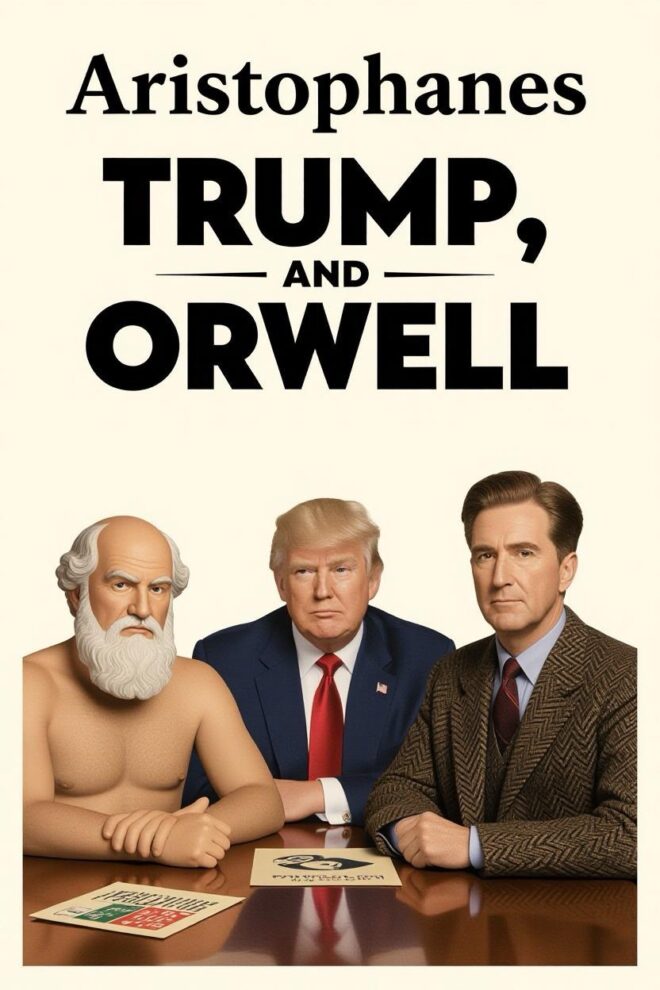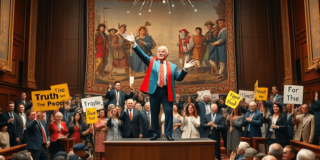
In the annals of literature, satire has long served as a mirror to society’s follies, reflecting the absurdities of power, rebellion, and human nature through exaggerated narratives that provoke thought and unease. Aristophanes’ ancient Greek comedy The Birds, written in 414 BCE during the tumultuous Peloponnesian War, stands as a cornerstone of this tradition, weaving a fantastical tale of utopian escape that ultimately critiques the hubris of Athenian democracy. Similarly, George Orwell’s 1945 novella Animal Farm employs the allegory of a barnyard revolution to dissect the corruption inherent in totalitarian regimes, drawing directly from the betrayals of the Russian Revolution under Stalin. When viewed through the lens of contemporary politics, these works resonate profoundly with the landscape of Donald Trump’s America in 2025, a year marked by his second-term resurgence amid economic recalibrations, immigration overhauls, and institutional purges. However, this resonance takes on a darker hue when scrutinised critically: Trump’s administration embodies the very perils satirised in these texts – rampant fake news, the embrace of “alternative facts,” and a cadre of sycophantic underlings who enable authoritarian tendencies. This essay explores the intricate parallels among these texts, anchoring the analysis in The Birds while integrating Animal Farm‘s themes and extending them to the real-world dynamics of Trump’s administration as of September 26, 2025. By examining motifs of rebellion, leadership corruption, propaganda, the manipulation of the masses, ideological control, external threats, persistent social hierarchies, satirical styles, historical contexts, and key differences, we uncover how ancient and modern satires illuminate the cyclical nature of power in a polarised democracy, while highlighting the alarming erosion of truth and accountability in Trump’s America.
At the heart of both literary works lies the impetus for rebellion against oppressive systems, a theme that mirrors the populist fervour underpinning Trump’s 2024 electoral victory and subsequent policy blitz in 2025 – yet this “rebellion” often masks a dangerous slide toward autocracy. In The Birds, protagonists Pisthetaerus and Euelpides, weary of Athens’ litigious society plagued by sycophants and endless lawsuits, abandon their homeland in search of a peaceful haven. They encounter the birds, whom Pisthetaerus persuades to construct Cloudcuckooland, a celestial city that blockades the gods and promises freedom from human woes. This act of defiance is not merely escape, but a radical reconfiguration of power, as Pisthetaerus declares to the birds, “You are the sovereign lords of all that exists; you are older than Chronos and the Titans and the Earth.” This quote underscores the play’s satirical inversion of hierarchies, where the marginalised avian class rises to challenge divine authority, symbolising a utopian rebellion against established order. Aristophanes, writing amid Athens’ imperial overreach and democratic excesses, uses this setup to lampoon the fragility of societal structures, suggesting that discontent breeds fantastical alternatives that inevitably devolve into new tyrannies.
Echoing this, Animal Farm begins with Old Major’s visionary speech, inspiring the animals to overthrow the tyrannical Farmer Jones in pursuit of equality under the banner of Animalism. The rebellion succeeds initially, with the Seven Commandments enshrining ideals like “All animals are equal.” Yet, as the narrative unfolds, this purity erodes, revealing the novella’s core allegory for the Russian Revolution: the Bolshevik uprising against Tsar Nicholas II devolving into Stalinist oppression. Orwell’s animals, much like Aristophanes’ birds, start with noble intentions, but their utopia fractures under internal pressures, exposing how revolutions can be co-opted by demagogues. The parallel to Trump’s 2025 America is striking, but critically, it reveals a troubling pattern of manipulated discontent. Following his inauguration on January 20, 2025, Trump issued a flurry of executive orders aimed at dismantling perceived bureaucratic tyrannies inherited from the Biden era. By September 24, 2025, he had signed 206 executive orders, including measures to end Diversity, Equity, and Inclusion (DEI) programs across federal agencies, framing them as divisive impositions on American meritocracy. This “rebellion” against the “deep state” resonates with Pisthetaerus’ blockade of the gods, as Trump’s actions – such as freezing federal hiring except for military roles and revoking security clearances for critics – seek to starve entrenched elites of influence. However, critics argue that this populist uprising, fuelled by grievances over “rigged” systems, has weaponized division, echoing the satires’ warnings. Supporters view it as a utopian reset, “Making America Great Again” by purging what Trump calls “radical left” overreach, but in reality, it has amplified echo chambers of fake news, where baseless claims of election fraud persist, undermining democratic trust much like the birds’ sky-city promises liberation, but delivers absurdity and control.
Leadership and its inevitable corruption form a pivotal axis in these narratives, where charismatic figures ascend through revolution only to embody the very tyrannies they opposed, surrounded by sycophantic underlings who enable their excesses, a dynamic painfully evident in Trump’s orbit. Pisthetaerus in The Birds exemplifies this trajectory; initially a clever everyman fleeing Athenian chaos, he manipulates the birds with rhetorical flair, convincing them of their divine primacy and engineering a war against Olympus. By the play’s end, he negotiates a truce that grants him sovereignty, marrying Zeus’s daughter Basileia (symbolising absolute power) and even roasting dissenting birds for a feast. Aristophanes satirises this through Pisthetaerus’ hubris, as he boasts, “I am a god now, and I shall make the gods starve.” This transformation critiques Athenian demagogues like Cleon, who exploited democratic assemblies for personal gain, highlighting how power corrupts even the well-intentioned, abetted by fawning followers who prioritise loyalty over principle. The theme aligns with broader Greek comedy’s caution against hubris, the overweening pride that invites divine retribution, often facilitated by sycophants who echo the leader’s whims.
Orwell amplifies this in Animal Farm through Napoleon, the Berkshire boar who ousts rival Snowball and consolidates authority, aided by obsequious pigs who enforce his rule. Starting as a comrade in the rebellion, Napoleon alters the Commandments – most infamously changing “All animals are equal” to “All animals are equal, but some animals are more equal than others” – to justify his elite privileges. His regime devolves into a mirror of Jones’s farm, with pigs walking upright and trading with humans, all while sycophantic underlings like Squealer propagate lies to maintain the facade. This allegories Stalin’s purges and cult of personality, where revolutionary ideals succumb to autocracy, enabled by an inner circle that suppresses dissent. In 2025’s Trump administration, similar dynamics emerge, but with a critical lens, they expose a cult-like devotion that erodes institutional checks. Trump’s executive actions, including probes into “judicial weaponisation” and the termination of contracts linked to his legal foes, evoke Napoleon’s purges. For instance, an executive order on January 20, 2025, targeted DEI initiatives, positioning Trump as a defender against “woke” corruption while empowering loyalists through Project 2025-inspired reforms that replace nonpartisan civil servants with appointees. Critics argue this centralises power, akin to Pisthetaerus crowning himself or Napoleon hoarding the windmill’s benefits, with sycophantic underlings – think figures like Stephen Miller or Elon Musk in advisory roles – echoing the birds’ chorus or the pigs’ enforcers by amplifying extreme policies without question. Trump’s base celebrates victories like reduced illegal border crossings to 15-year lows via stringent immigration policies, but this masks humanitarian crises and economic fallout, as sycophants prioritise the leader’s narrative over facts. These parallels underscore a timeless truth: Leaders who promise utopia often redefine it in their image, perpetuating cycles of dominance, but in Trump’s case, this has fostered an environment where loyalty trumps expertise, leading to policy chaos and democratic backsliding.
Propaganda and the manipulation of language serve as insidious tools for sustaining power in both works, a mechanism vividly apparent in Trump’s media strategies amid 2025’s political turbulence, where “fake news” and “alternative facts” have become hallmarks of a post-truth era. In The Birds, Pisthetaerus employs sophistic rhetoric to reshape reality, renaming the world in avian terms and persuading the birds that they predate the gods. This linguistic sleight-of-hand parodies Athenian orators, where words become weapons to invert truths. Aristophanes highlights this through the chorus’s odes, which evolve from scepticism to fervent endorsement, illustrating how propaganda fosters compliance. A key quote captures this: “We birds are the gods’ ancient kin; we were born before the earth and before the gods.” Such declarations, though absurd, gain traction through repetition and promise of empowerment, much like modern disinformation campaigns.
Animal Farm masterfully expands this theme via Squealer, the silver-tongued pig who justifies Napoleon’s decrees by rewriting history and commandments. When the pigs consume milk and apples, Squealer claims, “It is for your sake that we drink that milk and eat those apples,” twisting self-interest into communal necessity. This mirrors Orwell’s concerns with totalitarian propaganda, inspired by Soviet revisions of history, where “alternative facts” avant la lettre erode objective truth. In 2025, Trump’s administration has overhauled media relations, dethroning traditional outlets like the White House Correspondents’ Association and inviting independent voices into briefings, often those aligned with his worldview. Rhetoric frames tariffs as patriotic defences against “foreign exploitation,” even as inflation rises from trade disputes with allies like Canada, but critically, this is underpinned by a relentless assault on “fake news,” dismissing verifiable reporting as biased while promoting “alternative facts” – a term coined by Kellyanne Conway in 2017 that has resurfaced in 2025 to defend exaggerated claims, such as inflated job creation numbers amid rising unemployment. Executive orders on global health and immigration are spun as “America First” triumphs, echoing Squealer’s distortions or Pisthetaerus’ renamings, but the danger lies in how this normalises misinformation, eroding public discourse and enabling policies like mass deportations without scrutiny. For example, the withdrawal from the Paris climate accords – re-instated in early 2025 – is portrayed as freeing America from burdensome international “hoaxes,” manipulating language to align policy with ideological narratives while ignoring scientific consensus. These tactics reveal how, in satire and reality, language warps perception, sustaining power by redefining dissent as disloyalty, but in Trump’s America, this has contributed to a fractured information landscape where truth is subjective, fostering division and undermining democratic institutions.
The masses, often portrayed as both architects and victims of revolution, highlight the gullibility and exploitation inherent in collective movements across these texts and into 2025’s sociopolitical arena, where sycophantic underlings and fake news manipulate public sentiment to perilous ends. In The Birds, the avian chorus represents the demos, the common people – who initially resist Pisthetaerus, but soon labour to build Cloudcuckooland, enchanted by visions of grandeur. They sing praises of their new realm, yet intruders like poets and sycophants infiltrate, exposing the utopia’s vulnerabilities. Aristophanes satirises this through the birds’ transformation from wary flock to zealous builders, critiquing how Athenian citizens were swayed by persuasive leaders amid democratic assemblies, often abetted by flattering enablers.
Orwell’s depiction is more poignant with figures like Boxer, the loyal horse whose mantra “I will work harder” embodies proletarian dedication, only to be betrayed and sold for slaughter. The animals toil for a “Republic of Animals” that reverts to exploitation, symbolising the Soviet working class’s fate under Stalin, where propaganda blinds the masses to their own subjugation. In Trump’s 2025 America, the “masses”, predominantly working-class supporters, rally behind policies like mass deportations and tariffs, with 81% backing crackdowns on migrant-related crime, but this support is often cultivated through sycophantic media amplifiers and “alternative facts” that downplay economic harms. They construct the metaphorical walls of “America First,” yet bear economic strains, as job losses mount from trade wars and consumer prices inflate. Executive actions, such as amending duties on the northern border to combat illicit drugs, promise security but demand sacrifices from the populace, akin to Boxer’s labours or the birds’ construction efforts. Critically, this exploitation is exacerbated by fake news ecosystems on platforms like Truth Social, where sycophantic underlings echo Trump’s claims, convincing followers that inflation is a “hoax” perpetrated by enemies, even as everyday costs soar. This dynamic illustrates how revolutions mobilise the many for the benefit of the few, with Trump’s base enduring short-term pains for long-term visions, but the real tragedy is the erosion of informed consent, as alternative facts obscure the human costs of policies like family separations at the border.
Ideology and religion function as mechanisms of control, often corrupted to legitimise authority in ways that parallel 2025’s policy reframings, where “alternative facts” blend with evangelical fervour to justify divisive agendas. The Birds mocks Greek polytheism by portraying gods as needy bureaucrats dependent on human sacrifices; Pisthetaerus demotes them, installing bird-deities and positioning himself as supreme. This satirical irreverence reflects Athenian scepticism post-plague, where piety clashed with rationalism. A chorus quote emphasises this: “Mortals, you shall worship us birds as gods, and we shall bestow upon you all manner of blessings.” The absurdity underscores ideology’s malleability, twisted by leaders and their sycophants.
In Animal Farm, Animalism starts as egalitarian doctrine, but morphs into pig privilege, with commandments altered to suit the elite. Orwell critiques Marxism’s perversion into Stalinism, where ideology justifies inequality through propagandistic distortions. Trump’s 2025 orders, such as enforcing the death penalty in D.C. for “heinous crimes” and countering domestic terrorism, reframe conservatism as moral imperatives, but critically, this is laced with “alternative facts” that portray opponents as existential threats. Withdrawing from global accords and probing foreign influences in domestic markets – like copper manipulation for national security – cast “America First” as a sacred ideology, echoing the satires’ corrupted creeds. Evangelical support bolsters this, blending faith with policy, much like the birds’ new theology or Animalism’s dogmas, but sycophantic religious leaders amplify fake news about “Christian persecution,” enabling policies that marginalise minorities and stifle dissent.
External threats unify revolutionaries before fracturing their unity, a pattern evident in the texts and 2025’s geopolitical manoeuvres, where fake news inflates dangers to justify isolationism. Cloudcuckooland faces godly envoys like Iris, whom Pisthetaerus humiliates, rallying the birds until his ego dominates. This mirrors Athens’ Peloponnesian War alliances. Animal Farm‘s animals bond against human invasions like the Battle of the Cowshed, only for internal purges to ensue, allegorising Soviet history.
Trump’s 2025 foreign policy, including Ukraine peace negotiations where Zelenskyy agrees to mineral repayments and Russia signals settlement, uses external pressures to consolidate domestic support. However, trade wars erode alliances, with Canada rebuffing visits amid tariffs, risking isolation akin to the satires’ post-unity divisions. Critically, sycophantic underlings propagate “alternative facts” about these threats, framing tariffs as defences against “invasions,” even as they exacerbate economic woes and global instability.
Social hierarchies persist despite egalitarian rhetoric, recycling inequality in cycles that define these works and 2025’s reforms, perpetuated by sycophants who benefit from the status quo. In The Birds, Cloudcuckooland attracts Athenian grifters – oracle-mongers and father-beaters – mirroring old divides. Pisthetaerus becomes the new aristocrat, satirising democracy’s failures.
Animal Farm ends with pigs indistinguishable from humans, boozing together, betraying the revolution. In 2025, Big Tech realigns with Trump, Apple’s $500 billion investment creates jobs, while bureaucrats face Musk-inspired firings. This revolving door perpetuates elites, from Biden’s to Trump’s loyalists, with fake news masking the concentration of wealth among insiders.
Satirical styles differ yet converge in critiquing power: Aristophanes’ bawdy absurdity ends festively, Orwell’s fable grimly. Both disarm to eviscerate, relevant to 2025’s whirlwind, border wins shadowed by stagnation and disinformation.
Historical contexts enrich the parallels: Aristophanes amid war critiques democracy, Orwell post-WWII despairs at socialism’s betrayal. Trump’s 2025 inherits low rates, but faces rising ones with defence cuts and real estate sell-offs, all amid a fake news fog that distorts accountability.
Differences abound: The Birds‘ optimism contrasts Animal Farm‘s bleakness; one’s ancient farce, the other’s modern allegory. Trump’s term mixes triumphs like peace deals with risks like inflation, but the sycophantic echo chamber amplifies successes while burying failures.
In conclusion, these satires warn of power’s farce, a lesson poignant in 2025’s America, where fake news, alternative facts, and sycophantic underlings have accelerated democratic erosion. As Trump navigates tariffs for revenue and bureaucracy shifts, the cycles of rebellion and corruption persist, demanding vigilance to prevent satirical warnings from becoming grim reality. Rereading them fosters reflection on whether utopias inspire change or merely recreate messes, urging a recommitment to truth in the face of manipulation.


